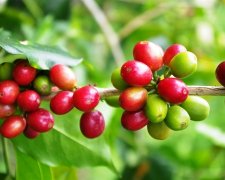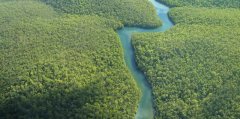What kind of Salvadoran coffee beans are in blue bottles? Reform Manor in El Salvador & Popolon processing Plant

For professional baristas, please follow the coffee workshop (Wechat official account cafe_style)
Introduction:
Active volcanic activity brings mineral-rich volcanic ash to El Salvador, and the soil dominated by volcanic ash contains more minerals and less organic matter, so in order to maintain its geographical location and make up for the lack of organic matter, Salvadoran farmers will use the pulp residue of treated coffee beans or organic matter under coffee trees as fertilizer to make up for the lack of organic matter in the soil. Make the planting of coffee trees more able to produce coffee beans with harmonious taste. El Salvador's most meaningful initiative is to introduce organic agriculture to the world, growing more than 150000 tons of organic coffee each year.
Salvadoran coffee has five major producing areas (Apaneca, Central Belt, Chichontepec, Tecapa& Cacahuatique Mountain Range), all of which are generally distributed on volcanic ash-covered mountain slopes or plateau areas at an altitude of 1200 meters above sea level. November to April of the following year is the coffee harvest and harvest season. Because coffee prefers mild climate, coffee trees in El Salvador are mainly planted in tall shade (shade grown coffee), in order to avoid excessive temperature and direct exposure to the sun, affecting the quality of coffee beans. The coffee beans produced by it belong to Arabica species, mainly from Pacas and Bourbon brands, and belong to big beans with sweet taste and excellent flavor.
The El Borbollon, owned by the Alvarez family, has grown coffee in El Salvador for more than 100 years and is now run by a fourth generation successor. The coffee processing plant comes from two nearby estates, one is La Reforma (and) and the other is El Cerro Reform (La Reforma), which was founded by Rafael Alvarez Lalinde in 1892 and is owned by the same family as the processing plant. The Eduardo Alvarez processing plant is now run by Eduardo Alvarez, and the second runner-up of the 2011 El Salvador CoE National Competition is Reform Manor (Finca La Reforma), owned by the Alvarez family, best known as the Popron processing Plant (El Borbollon) treatment plant. Reform Manor (Finca La Reforma) is located in the Santa Ana volcano area, Mount Santa Ana's volcanic nutrients and unique climate, is a rich resource of coffee in this area, but also because the volcano has excellent topography and climate to produce superior quality coffee. The Alvarez family contributes a lot to the local community, providing free medical and basic education facilities to benefit employees. Flavor features: the aroma of vanilla, lemon grass and other herbs, the flavor of almond, walnut and milk chocolate, the front and rear all have very soft acidity and clean almond aroma.
Producing area: Santa Ana Volcano producing area (Santa Ana)
Manor: reform Manor & Bobolone processing Plant (La Reforma & El Borbollon)
Variety: red bourbon (Red Bourbon)
Altitude: 1300 to 1500 m
Grade: SHB
Treatment: washing treatment
Harvest time: October of each year to February of the following year
Award winning record of Bobolong processing plant:
10th place in 2010 COE Excellence Cup
2009 COE Excellence Cup 20th place 2008 COE Excellence Cup 5th and 23rd
2007 COE Excellence Cup 20th place 2005 COE Excellence Cup 3rd place
Fresh cantaloupe fragrant raw beans, high quality wine acid value, very juicy fruit sweet and sour, syrup sweet
Texture, purple grapes, cherry juice, complex berry flavor and meticulous sun feel, refreshing tanning El Salvador beans.
Important Notice :
前街咖啡 FrontStreet Coffee has moved to new addredd:
FrontStreet Coffee Address: 315,Donghua East Road,GuangZhou
Tel:020 38364473
- Prev

Manual experience of Salvadoran Coffee description of flavor and taste of Salvadoran gourmet coffee
For the exchange of professional baristas, please follow the coffee workshop (Wechat official account cafe_style) Salvador El Salvador this is the second hand-brewed coffee I have made at home. I think there are three success factors in home hand-brewing coffee, first: the condition of beans, second: temperature control, third: hand-brewing technology, the first hand-brewing test a few days ago, is one of mine.
- Next

What is the roasting degree of Tanzanian coffee? introduction to selected sun-treated coffee from Elton Farm
For professional baristas, please follow the coffee workshop (Wechat official account cafe_style) [Sweet Mary selection-Sweet Marias selection] Tanzania coffee Elton Farm tanning treatment varieties: bourbon grade: AA/AB appearance: .8 dash 300grgrgrgrgrgrr 17-19 Screen raw bean treatment: sun treatment production area: Mbozi flavor introduction ripening,
Related
- Detailed explanation of Jadeite planting Land in Panamanian Jadeite Manor introduction to the grading system of Jadeite competitive bidding, Red bid, Green bid and Rose Summer
- Story of Coffee planting in Brenka region of Costa Rica Stonehenge Manor anaerobic heavy honey treatment of flavor mouth
- What's on the barrel of Blue Mountain Coffee beans?
- Can American coffee also pull flowers? How to use hot American style to pull out a good-looking pattern?
- Can you make a cold extract with coffee beans? What is the right proportion for cold-extracted coffee formula?
- Indonesian PWN Gold Mandrine Coffee Origin Features Flavor How to Chong? Mandolin coffee is American.
- A brief introduction to the flavor characteristics of Brazilian yellow bourbon coffee beans
- What is the effect of different water quality on the flavor of cold-extracted coffee? What kind of water is best for brewing coffee?
- Why do you think of Rose Summer whenever you mention Panamanian coffee?
- Introduction to the characteristics of authentic blue mountain coffee bean producing areas? What is the CIB Coffee Authority in Jamaica?

